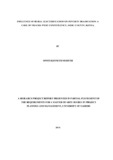| dc.description.abstract | In the pursuit of Vision 2030 in improving the quality of life of Kenyans by the year 2030, a
need arose to find out the influence of rural electrification on poverty reduction. This study
assessed the role of rural electrification on poverty reduction in Tigania West constituency.
Tigania West constituency is one of the five constituencies in Meru North District. It covers
Tigania North, Tigania West, Tigania South and Uringu divisions. The study was guided by
four objectives which are the influence of rural electrification on job creation, the influence of
rural electrification on education provision, the influence of rural electrification on healthcare
provision, and the influence of rural electrification on information communication and
technology in Tigania West Constituency. The focus was on households that were
beneficiaries of Rural Electrification Programme in the region, with information being
collected from the household heads only. A sample size was 153 was calculated scientifically
as a sufficient representation for a population of 2650 metered households, who were the total
recipients of the electrification programme in the constituency. Stratified random sampling
method was used to identify the elements to make up the sample. Because there were four
divisions in the constituency, the 153 members of the sample were chosen equally from the
divisions with each division contributing about 38 respondents. After deciding on the number
to be taken from the four strata, the simple random sampling technique was used to get the
respondents. The research tool used to collect the data was the questionnaire, administered to
the sample. The descriptive research design was chosen because most of the information
obtained was quantitative, making this method the most suitable for data representation, with
results presented in tables with frequencies and percentages. The study found out that rural
electrification enhanced empowerment of the members through information, education and
health services among others. People in the community are more knowledgeable through
mediums like television and the internet. It was also be concluded that through rural
electrification, the quality of life of the people in the community became better, in terms of
better health services, longer study hours, access to cheaper communication, easier and
cleaner lighting and a more cleaner environment, free from air pollution from burnt kerosene
particles | en_US |

